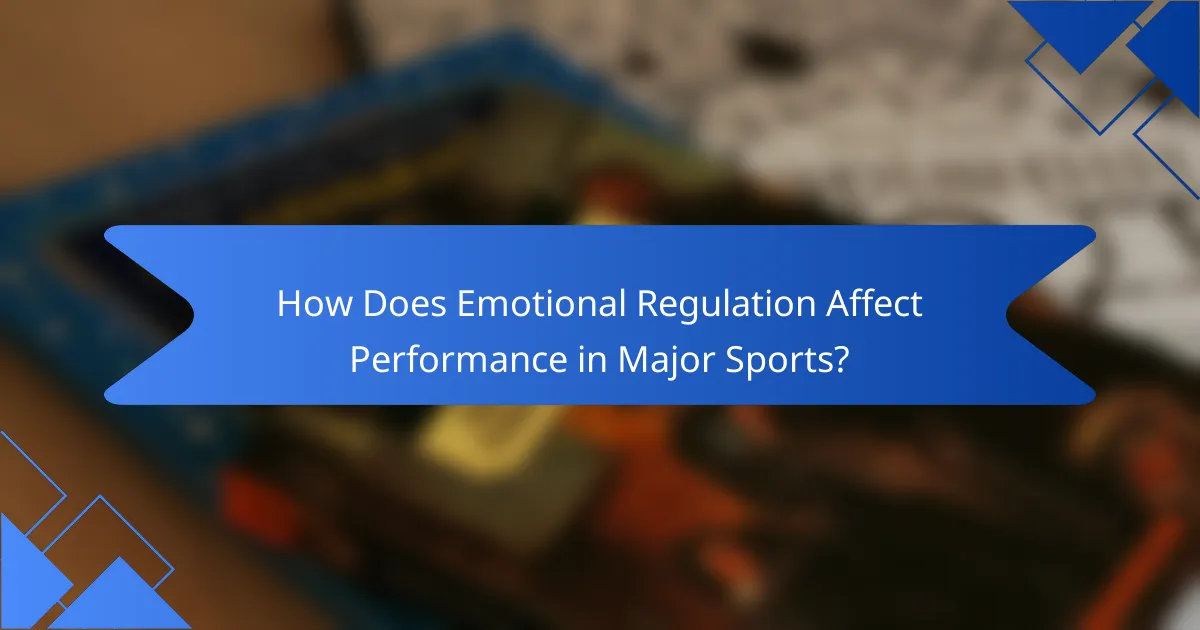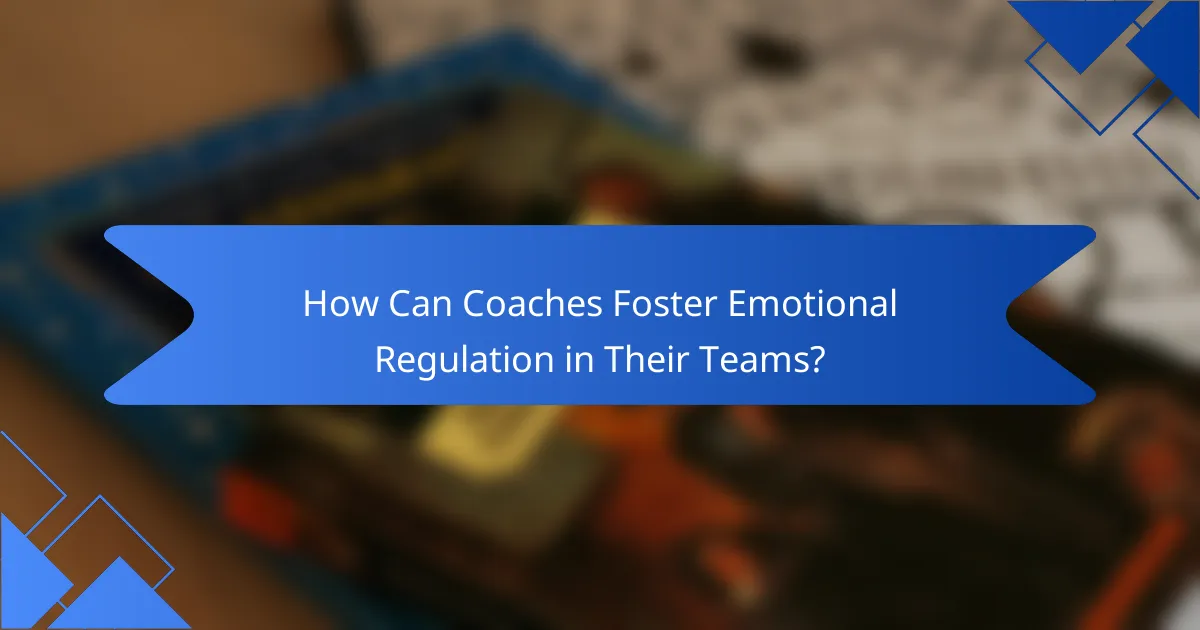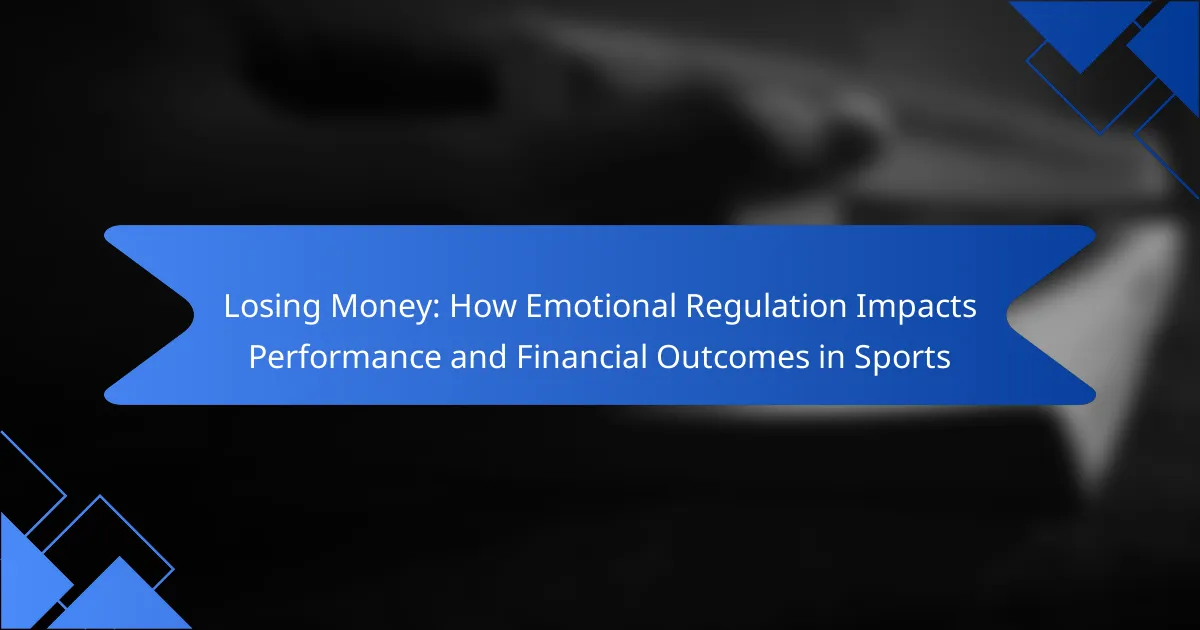Emotional regulation is crucial for athletes aiming to enhance their performance and financial outcomes. It influences focus, decision-making, and resilience during competitions. Effective strategies like mindfulness and cognitive restructuring can lead to better performance and increased earnings. Coaches play a vital role in fostering these skills, ultimately impacting team dynamics and financial success.

How Does Emotional Regulation Affect Performance in Major Sports?
Emotional regulation significantly affects performance in major sports by influencing athletes’ focus and decision-making. Effective emotional control enhances concentration, reduces anxiety, and promotes resilience during competitions. Studies show that athletes who manage their emotions perform better, leading to improved financial outcomes through higher winnings and sponsorship opportunities. A unique aspect is the correlation between emotional stability and long-term career success, where athletes with strong emotional regulation often experience sustained performance levels.
What Are the Key Emotional Regulation Systems Used by Athletes?
Athletes utilize various emotional regulation systems to manage stress and maintain performance. Key systems include cognitive reappraisal, mindfulness, and emotional suppression. Cognitive reappraisal helps athletes reinterpret stressful situations, leading to improved focus and decision-making. Mindfulness enhances present-moment awareness, reducing anxiety and fostering resilience. Emotional suppression, though less effective long-term, can temporarily shield athletes from overwhelming emotions. These systems directly impact both performance and financial outcomes in sports, as emotional stability correlates with better results and financial success.
How Do Emotional States Influence Decision-Making on the Field?
Emotional states significantly influence decision-making in sports, affecting performance and financial outcomes. Athletes who effectively regulate emotions can maintain focus and make better choices under pressure. For instance, positive emotions enhance confidence, while negative emotions can lead to impulsive decisions that result in financial losses. Research shows that emotional regulation strategies, such as mindfulness, can improve decision quality in high-stakes situations. Athletes who manage their emotional responses tend to perform better and secure more favorable financial results.
What Role Does Stress Play in Athletic Performance?
Stress negatively impacts athletic performance by impairing emotional regulation. High stress levels can lead to anxiety, reducing focus and decision-making abilities. Athletes experiencing stress may struggle to maintain optimal performance, resulting in poorer financial outcomes in sports. Effective stress management techniques, such as mindfulness and visualization, can enhance emotional regulation, improving both performance and financial success.
How Do Positive Emotions Enhance Performance?
Positive emotions significantly enhance performance by fostering resilience and focus. They enable athletes to manage stress effectively, leading to improved decision-making and execution. Research indicates that positive emotional states correlate with higher levels of concentration and creativity, which are crucial in sports. Athletes experiencing positive emotions are more likely to engage in adaptive behaviors, ultimately resulting in better financial outcomes.

What Are the Universal Benefits of Effective Emotional Regulation?
Effective emotional regulation enhances performance and financial outcomes in sports by improving decision-making and resilience. Athletes who manage their emotions can maintain focus, reduce anxiety, and avoid impulsive actions that lead to financial losses. Research indicates that emotional regulation contributes to better strategic thinking, allowing athletes to make calculated risks rather than emotional ones. This unique ability to control emotions can lead to sustained success and increased earnings in competitive sports.
How Can Emotional Regulation Lead to Better Financial Outcomes?
Emotional regulation can significantly enhance financial outcomes by improving decision-making and performance in sports. Athletes who manage emotions effectively tend to make more rational financial choices, reducing the likelihood of losses. Research indicates that emotional stability correlates with better financial management, ultimately leading to increased earnings and investment success. As a result, athletes who develop emotional regulation skills are more likely to achieve long-term financial stability.
What Are Common Emotional Regulation Techniques in Sports?
Emotional regulation techniques in sports enhance performance and financial outcomes. Common methods include mindfulness, cognitive restructuring, and controlled breathing. Mindfulness helps athletes stay present, reducing anxiety. Cognitive restructuring allows them to reframe negative thoughts, promoting a positive mindset. Controlled breathing techniques manage physiological responses, aiding focus and composure. These techniques collectively improve decision-making and resilience, ultimately impacting financial success in competitive environments.

What Unique Emotional Regulation Strategies Are Employed by Top Athletes?
Top athletes employ unique emotional regulation strategies to maintain focus and resilience, impacting performance and financial outcomes. Techniques include mindfulness, visualization, and cognitive restructuring. Mindfulness enhances present-moment awareness, reducing anxiety. Visualization helps athletes mentally rehearse success, boosting confidence. Cognitive restructuring allows for reframing negative thoughts into positive affirmations, fostering a growth mindset. These strategies contribute to better decision-making, ultimately influencing financial success in sports.
How Do Individual Differences Affect Emotional Regulation Approaches?
Individual differences significantly influence emotional regulation approaches, impacting performance and financial outcomes in sports. Factors such as personality traits, emotional intelligence, and coping styles shape how athletes manage emotions during high-stakes situations. For instance, athletes with high emotional intelligence can better navigate stress, leading to improved decision-making and performance. Conversely, those with lower emotional regulation may experience heightened anxiety, negatively affecting financial outcomes. Understanding these individual differences helps coaches tailor emotional regulation strategies, enhancing both performance and financial results in competitive sports.
What Are the Unique Challenges Faced by Athletes in High-Stakes Situations?
Athletes in high-stakes situations face unique challenges that significantly impact their performance and financial outcomes. Emotional regulation is crucial; athletes who manage their emotions effectively tend to perform better under pressure.
High-stakes environments often induce stress, leading to anxiety and impaired decision-making. For example, athletes may struggle to focus, resulting in mistakes that can cost them financially. Furthermore, the fear of losing money can exacerbate performance anxiety, creating a cycle that hinders success.
Another challenge is the pressure to meet expectations from sponsors and fans. This pressure can lead to overthinking and second-guessing, which can detract from an athlete’s natural abilities. The emotional toll of high expectations can result in burnout, impacting both performance and financial stability.
Lastly, the lack of support systems for emotional well-being can leave athletes vulnerable. Many do not receive adequate mental health resources, making it difficult to navigate the pressures of high-stakes competition. Addressing these challenges is essential for improving both performance and financial outcomes in sports.
How Do Different Sports Require Different Emotional Regulation Techniques?
Different sports require tailored emotional regulation techniques due to their unique demands and environments. For example, team sports often necessitate collective emotional management, while individual sports focus on self-regulation. Athletes in high-stakes situations, such as championship games, may employ techniques like visualization and mindfulness to maintain composure and focus. Conversely, endurance athletes might use positive self-talk and goal-setting to combat fatigue and anxiety. The emotional regulation strategy directly impacts performance and financial outcomes, as athletes who manage their emotions effectively can enhance their competitive edge and secure better financial rewards.

What Rare Emotional Regulation Practices Can Enhance Performance?
Rare emotional regulation practices can significantly enhance performance in sports by fostering resilience and focus. Techniques such as mindfulness meditation, emotional journaling, and biofeedback training allow athletes to manage stress and anxiety effectively. These practices promote self-awareness and emotional clarity, which can lead to improved decision-making during competitions. Research indicates that athletes who engage in these unique practices often experience better financial outcomes through enhanced performance, as they are more capable of maintaining composure under pressure.
How Can Mindfulness Practices Influence Emotional Regulation in Sports?
Mindfulness practices significantly enhance emotional regulation, leading to improved performance and financial outcomes in sports. By fostering awareness and focus, athletes can better manage stress and anxiety, which often affect decision-making and performance under pressure. Research indicates that athletes who engage in mindfulness report lower levels of emotional reactivity and improved concentration, subsequently leading to better financial performance through enhanced competitive results. Additionally, mindfulness training can cultivate resilience, allowing athletes to recover from setbacks more effectively, ultimately influencing their financial success in the sports industry.
What Are the Emerging Trends in Emotional Regulation Research?
Emotional regulation research is increasingly focusing on how athletes manage emotions related to financial outcomes. Emerging trends include the exploration of mindfulness techniques, which enhance emotional resilience, and the impact of cognitive behavioral strategies on performance. Studies indicate that effective emotional regulation can significantly improve decision-making in high-pressure financial situations, leading to better outcomes. Additionally, researchers are examining the role of emotional intelligence in sports, revealing that athletes with higher emotional awareness tend to perform better financially.

How Can Coaches Foster Emotional Regulation in Their Teams?
Coaches can foster emotional regulation in their teams by implementing structured support systems. Establishing regular check-ins allows players to express emotions, leading to improved focus and performance. Training sessions that incorporate mindfulness techniques can enhance self-awareness, reducing anxiety during high-pressure situations. Encouraging open communication creates a culture where players feel safe discussing feelings, which can directly impact financial outcomes by minimizing costly mistakes during games. Moreover, emphasizing the importance of emotional resilience can help athletes maintain composure, ultimately improving team dynamics and overall performance.
What Best Practices Can Athletes Implement for Effective Emotional Regulation?
Athletes can implement several best practices for effective emotional regulation, enhancing both performance and financial outcomes. Techniques include mindfulness meditation to increase self-awareness, cognitive restructuring to challenge negative thoughts, and visualization to prepare for high-pressure situations. Regular physical activity promotes emotional resilience, while establishing a support network provides necessary encouragement. Journaling helps track emotional triggers and responses, leading to better management strategies. These practices contribute to improved focus and decision-making, ultimately affecting financial success in sports.
What Common Mistakes Do Athletes Make Regarding Emotional Regulation?
Athletes often make mistakes in emotional regulation that negatively impact their performance and financial outcomes. Common errors include ignoring emotions, leading to poor decision-making, and failing to develop coping strategies, which can result in costly mistakes. Additionally, athletes may overreact to stressors, causing detrimental performance fluctuations. Another frequent mistake is a lack of self-awareness, preventing them from recognizing their emotional triggers.
How Can Emotional Regulation Training Be Incorporated into Sports Programs?
Emotional regulation training can enhance performance and financial outcomes in sports programs by providing athletes with tools to manage stress and anxiety. Incorporating techniques such as mindfulness, cognitive restructuring, and breathing exercises helps athletes maintain focus during high-pressure situations.
Additionally, integrating emotional regulation into training sessions can foster resilience, allowing athletes to recover quickly from setbacks. Programs that emphasize emotional skills may lead to improved decision-making, reducing impulsive financial behaviors influenced by emotional states.
Moreover, regular assessments of emotional well-being can guide tailored interventions, ensuring athletes receive support that addresses their unique challenges. This proactive approach not only enhances athletic performance but also promotes healthier financial habits, ultimately benefiting the overall success of sports programs.


